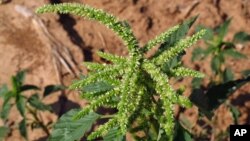From Aztec pigweed to dragon beans - several ancient, often forgotten foods are making their way to the dinner table in an effort to diversify the diet of a growing global population.
In an initiative to cut the world's dependency on major crops like wheat and rice - Britain's Prince Charles has launched the Forgotten Foods Network to rediscover long-lost crops, fruit and vegetables.
As rising temperatures wreak havoc on farmers worldwide, scientists are seeking new ways to feed a population that is set to boom to an estimated 9.8 billion by 2050.
Ancient food like pigweed once eaten by the Aztecs can be eaten raw or be ground into flour - one of many crops that could add valuable nutrients to a limited modern diet, say experts.
"We must move beyond the 'business as usual' approach of relying on monocultures of major, well-known crops, and invest in agricultural diversity," Charles said in video message.
The initiative was developed by Crops For the Future, a Malaysian organization doing crop research. Charles launched the campaign at their headquarters last week.













